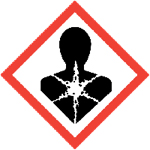Tetramethrin reclassification
Insecticides containing tetramethrin at a concentration of 1% and greater will, from the 1st of May 2020, be required to feature a new hazard phrase on the label: ‘H351: Suspected of causing cancer’ due to their reclassification as category 2 carcinogens. Such labels will also feature the ‘health hazard’ warning symbol.
The key word here is of course suspected.
Another key point to make is that processed meat and alcohol are group 1 carcinogens in that they are known to cause cancer.
Insecticides with a tetramethrin concentration at 10% or higher will additionally feature ‘H371: may cause damage to organs.’
A further talking point is the fact that many insecticides based on tetramethrin are diluted greatly prior to application.
Why is this label change coming?
First, a description of the different categories
A substance should be classified as carcinogenic Category 1A when it is known to have carcinogenic potential based on human evidence. There is no information about the potential carcinogenicity of tetramethrin for humans and therefore Category 1A is not supported. A substance can be classified as carcinogenic Category 1B when it is presumed to have carcinogenic potential in humans based on human evidences, while Category 2 is reserved for substances suspected to be carcinogenic based on evidence not sufficiently convincing to classify as Category 1.
Tetramethrin reviewed
In a review of tetramethrin following a proposal made by Germany, The European Chemicals Agency Risk Assessment Committee (ECHA RAC) noted that, despite the statistically significant increases in testicular interstitial cell tumours in two independent rat studies, the evidences are not strong enough to place tetramethrin in Category 1B. This is because there are uncertainties related to the mode of action and the relevance for humans. The ECHA RAC however considered that not all potential modes of action without relevance in humans can be disregarded with the available information and hence the relevance to humans cannot be ruled out. In conclusion, the ECHA RAC supported proposals for classifying tetramethrin for Carcinogenicity Category 2 (H351: Suspected of causing cancer). This applies to tetramethrin (ISO) and d-trans-tetramethrin and is in accordance with Article 37 (4) of Regulation (EC) No 1272/2008, the Classification, Labelling and Packaging (CLP) Regulation.
What does this mean for users?
- Products with tetramethrin at 1% and higher are required to feature the new phrase from the 1st of May 2020
- Products with tetramethrin at lower than 1% will not feature the phrase on their labels
- This is a timely reminder to follow label directions, especially risk mitigation measures
- Remember that the Health and Safety Executive have continued to authorise tetramethrin products at 1% concentration and above. This means that by following risk mitigation measures, on the label, you can keep risks to an acceptably low level for both users and others
- Continue with COSHH assessments
- A COSHH assessment may point you towards a product without the ‘suspected of causing cancer’ phrase, especially when you can gain equivalent control of the target pest with an alternative treatment
- Ensure you continue to make accurate records of treatments and COSHH assessments
Reminiscent of the rodenticide reclassifications ‘toxic to reproduction’?
- This change is perhaps reminiscent of the ‘toxic to reproduction’ reclassification applied to certain rodenticides, which placed further emphasis on following the label and mitigating risks
- However, the word ‘cancer’ perhaps has a greater impact
Keeping up to date
- It is a good idea to refresh your insect control training and to join an independent Continuing Professional Development (CPD) scheme
- Regarding insect control training, a course followed by an examination through an Awarding Organisation is recommended
- Keep up to date with news like this by working with a reputable product supplier that offers technical support
- Subscribe to industry periodicals edited by technically competent advisors
Seeking advice
- Speak to Killgerm Chemicals for technical advice regarding how these changes impact on specific products







